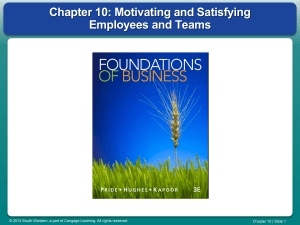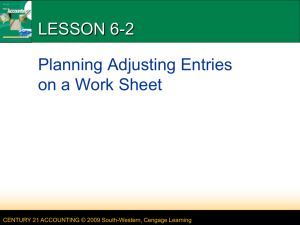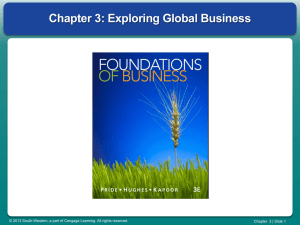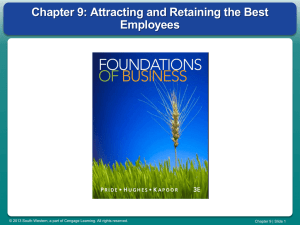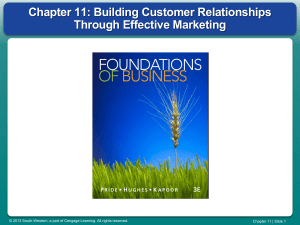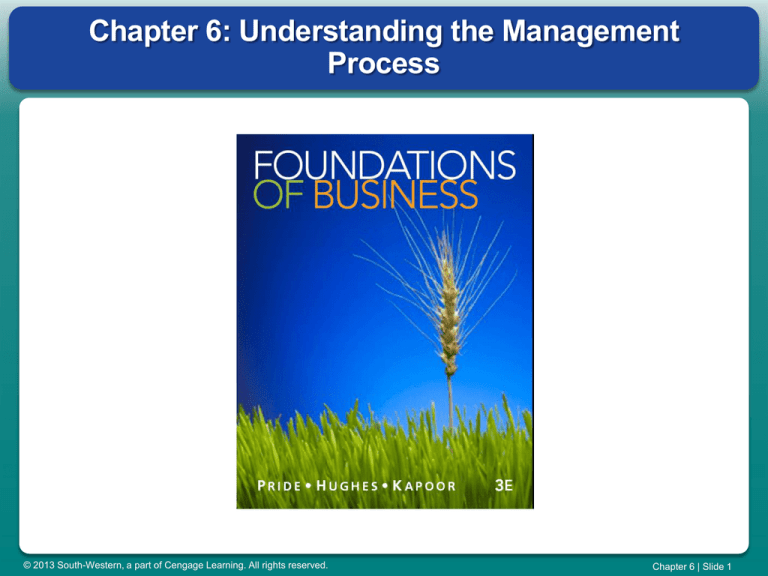
Chapter 6: Understanding the Management
Process
© 2013 South-Western, a part of Cengage Learning. All rights reserved.
Chapter 6 | Slide 1
Learning Objectives
Define what management is.
2. Describe the four basic management functions:
planning, organizing, leading and motivating, and
controlling.
3. Distinguish among the various kinds of managers in
terms of both level and area of management.
4. Identify the key management skills of successful
managers.
5. Explain the different types of leadership.
6. Discuss the steps in the managerial decision-making
process.
7. Describe how organizations benefit from total quality
management.
1.
© 2013 South-Western, a part of Cengage Learning. All rights reserved.
Chapter 6 | Slide 2
What Is Management?
“Management is the process of coordinating
people and other resources to achieve the
goals of an organization.”
© 2013 South-Western, a part of Cengage Learning. All rights reserved.
Chapter 6 | Slide 3
Basic Management Functions
Planning
1. Strategic Planning Process
2. Establishing Goals and Objectives
3. SWOT Analysis
4. Types of Plans
Organizing the Enterprise
Leading and Motivating
Controlling Ongoing Activities
© 2013 South-Western, a part of Cengage Learning. All rights reserved.
Chapter 6 | Slide 4
Kinds of Managers
Levels of Management
1. Top Managers
2. Middle Managers
3. First-Line Managers
Areas of Management Specialization
1. Financial Managers
2. Operations Managers
3. Marketing Managers
4. Human Resources Managers
5. Administrative Managers
© 2013 South-Western, a part of Cengage Learning. All rights reserved.
Chapter 6 | Slide 5
Key Skills of Successful Managers
Conceptual Skills
Analytical Skills
Interpersonal Skills
Technical Skills
Communication Skills
© 2013 South-Western, a part of Cengage Learning. All rights reserved.
Chapter 6 | Slide 6
Leadership
Formal and Informal Leadership
Styles of Leadership
Which Leadership Style Is the Best?
© 2013 South-Western, a part of Cengage Learning. All rights reserved.
Chapter 6 | Slide 7
Managerial Decision Making
Identifying the Problem or Opportunity
Generating Alternatives
Selecting an Alternative
Implementing and Evaluating the Solution
© 2013 South-Western, a part of Cengage Learning. All rights reserved.
Chapter 6 | Slide 8
Managing Total Quality
Total Quality Management (TQM)
Benchmarking
© 2013 South-Western, a part of Cengage Learning. All rights reserved.
Chapter 6 | Slide 9

